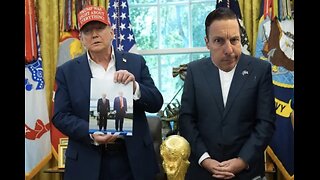Premium Only Content

The Mysterious Origins of Man: Part 2
This companion documentary to the original NBC broadcast, The Mysterious Origins of Man, features interviews with Michael Cremo and Richard L. Thompson, as well as a variety of so-called "suppressed scientists" who call into question the widely accepted Darwin's theory of evolution by natural selection. Through the presentation of alternative evidence the interview subjects lay out arguments against the notion that natural selection provides sufficient proof that humans and apes share a common ancestor.
Questioning the implications of a discovery of misshapen skulls, the film puts forth the suggestion that extraterrestrial beings were present on ancient Earth, perhaps playing a part in the origin of mankind. Ancient sites such as Giza, Egypt and Tiwanaku, Bolivia are also discussed later in the film, leading viewers to consider the existence of an as-yet unidentified ancient civilization and whether they may have played a part in humanity's development.
Graham Hancock, author of Fingerprints of the Gods expounds upon these ancient civilizations and introduces the pole shift hypothesis, which itself derives from something known as the crust shift theory. Proposing that Antarctica was initially further from the South Pole than it presently is, Hancock explains that geological shifts around 10,000 BC caused Antarctica to move to it's present location. He suggests that this shift caused the destruction of the legendary city of Atlantis, and enabled the disbursement of ancient civilizations to other continents, leading to the human race as we now know it.
An interview with an archaeologist also suggests mankind has existed for hundreds of millions of years longer than presently believed. His conviction rests on the discovery of a man-made tool found in proximity to dinosaur fossils, suggesting the two species co-existed. He also cites a more modern story in which an aeronautical engineer witnessed a flying creature matching the description of a pterodactyl, making the more outrageous suggestion that dinosaurs boasted greater longevity than we've been led to believe.
The researchers being interviewed are passionate about their claims, and defend their views with compelling arguments. Dismissed as pseudoscience by the greater scientific and academic communities, the theories presented in this documentary may be outlandish to some, but are entertaining nonetheless.
Source: https://youtu.be/VagAFlgTdYc
-
 13:59
13:59
Biological Medicine
12 hours agoCures and Preventions against Vaccines, Parasites, Bacterial and Fungal infections and Natural Home Remedies
438 -
 1:33:37
1:33:37
WolfsDenBoxing
1 hour ago $0.02 earnedThe Come Up Boxing Podcast - When you first walk in... What happens?
10.1K -
 1:07:26
1:07:26
Jeff Ahern
2 hours ago $0.04 earnedFriday Freak out with Jeff Ahern
16.6K -
 1:04:42
1:04:42
Crypto Power Hour
2 hours ago $0.02 earnedDeFi's SWIFT Replacement, 2026 Global Financial Revolution PART II
13.5K4 -
 21:07
21:07
Silver Dragons
4 hours agoBullion Dealer on GOLD VS SILVER Next 15 Years (SHOCKING!)
11.7K1 -
 20:29
20:29
T-SPLY
18 hours agoWashington Governor Under Risk Of Being Arrested!
18.9K30 -
 2:08:43
2:08:43
The Quartering
4 hours agoTrump's Big Announcement LIVE & Today's News!
150K54 -
 1:45:59
1:45:59
Tucker Carlson
6 hours agoAaron Lewis on Being Blacklisted from Radio & Why Record Labels Intentionally Promote Terrible Music
62.4K50 -
 5:55
5:55
Coin Stories with Natalie Brunell
7 hours agoWho's Selling Bitcoin? Preston Pysh on Bearish Sentiment, Bitcoin Treasury Warning Signs and Ponzis
9.73K -
 8:53
8:53
Dr. Nick Zyrowski
3 months agoStarve Fat Cells, ( Not Yourself ) - Ultimate Fat Loss Guide
19.3K2